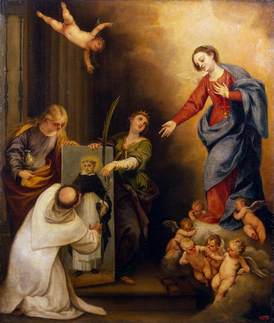Lord, you gave Blessed Benvenuta the gifts of penance, prayer and humility. Through self-denial and contemplation on heavenly things may we too live in the Spirit and find rest and glory in you, the one God.
Tag: Dominican saints and blesseds
Saint Dominic de Guzman
Preach we now the Word of life,
Not with show of worldly learning,
But with fervor of our faith
Open hearts to Spirit’s yearning.
Christ alone be ever knowing,
And Him crucified be showing.
Dominic, called by the Lord,
Preaching, teaching, daily blessing,
Living poor and common life,
Contemplation’s fruit expressing;
Thus he formed his Preachers boldly,
Showing graces manifoldly.
God the blessed Three in One,
Love beyond all human telling,
Father, Son, and Spirit blest,
Throned in heav’n and with us dwelling,
With the Word of Truth now feed us,
In Your holy ways now lead us.
78 78 88
suggested tune: Liebster Jesu
James Michael Thompson, (c) 2009, World Library Publications
Saint Catherine of Siena
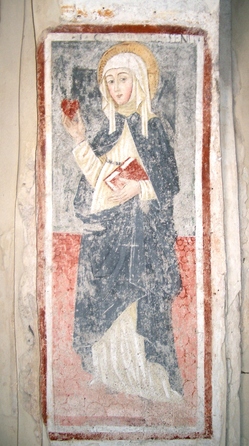 The Kingdom of heaven is like a merchant seeking good pearls, who, when he had found one of great price, gave all that he had and bought it, alleluia.
The Kingdom of heaven is like a merchant seeking good pearls, who, when he had found one of great price, gave all that he had and bought it, alleluia.
Blessed Fra Angelico
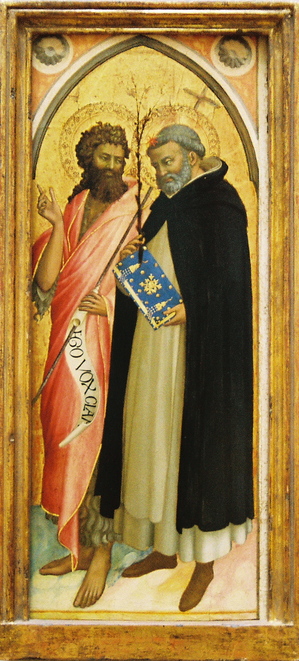 Known in the Dominicans as Brother John from
Known in the Dominicans as Brother John from
In declaring Fra Angelico the Patron of Catholic Artists in 1982, Pope John Paul II said: “Angelico was reported to say “He who does Christ’s work must stay with Christ always”. This motto earned him the epithet “Blessed Angelico”, because of the perfect integrity of his life and the almost divine beauty of the images he painted, to a superlative extent those of the Blessed Virgin Mary.”
Fra Angelico’s grave stone in the Dominican Church of Santa Maria sopra Minerva (
When singing my praise, don’t liken my talents to those of Apelles. Say, rather, that, in the name of Christ, I gave all I had to the poor. The deeds that count on Earth are not the ones that count in Heaven. I, Giovanni, am the flower of
When in
Blessed Jordan of Saxony
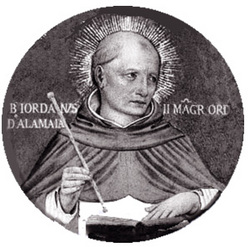 It has been said that “Jordan who, more than any one man after Saint Dominic himself, created the spirit of the Order, gave to it a joy and an informality in its daily life which are amongst its greatest treasures, for they enshrine and express a whole theology of religious life.”
It has been said that “Jordan who, more than any one man after Saint Dominic himself, created the spirit of the Order, gave to it a joy and an informality in its daily life which are amongst its greatest treasures, for they enshrine and express a whole theology of religious life.”
May Blessed Jordan of Saxony pray for the Order of Preachers today and always, and grant an increase of vocations to the Dominican Family. May he stir up the hearts of young men and women, as once he did on this earth, with a fervour for Truth, to give themselves in its service in the Order of Preachers. May he clothe us, his brothers and sisters, with his zeal and passion for Christ the Word, and may he give us cause joyfully to laugh in his company for ever. Amen.
Saint Thomas Aquinas
The Lord led the just in the right paths. And showed him the kingdom of God.
O God, Who does enlighten Thy Church by the wonderful learning of blessed Thomas, Thy Confessor, and makes it fruitful by his holy works; we beseech Thee, grant us both to understand what he taught and to follow his example in what he practiced.
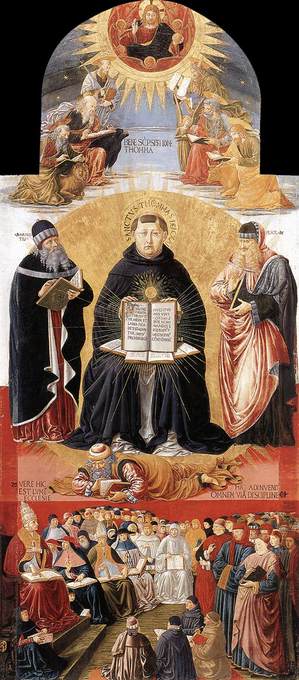 “The law of divine love is the standard for all human actions”
“The law of divine love is the standard for all human actions”
It is evident that not all are able to labor at learning and for that reason Christ has given a short law. Everyone can know this law and no one may be excused from observing it because of ignorance. This is the law of divine love. As scripture says, The Lord will quickly execute sentence upon the earth.
This law should be the standard for all human actions. In the case of products of human manufacture, each product is considered right and good when it conforms to a standard. So also each human act is considered right and virtuous when it conforms to the standard of divine love. But when a human act does not conform to the standard of love, then it is not right, nor good, nor perfect.
This law of divine love accomplishes in a person four things that are much to be desired. First, it is the cause of one’s spiritual life. For it is evident that by the very nature of the action what is loved is in the one who loves. Therefore whoever loves God possesses God in himself; for scripture says, Whoever remains in love remains in God and God in him. It is the nature of love to transform the lover into the object loved. And so if we love God, we ourselves become divinized; for again, Whoever is joined to God becomes one spirit with him. Augustine adds, “As the soul is the life of the body, so God is the life of the soul.” Thus the soul acts virtuously and perfectly when she acts through charity, and through charity God lives in her; indeed, without charity she cannot act; for scripture says, Whoever does not love, remains in death. If a person possesses all the gifts of the Holy Spirit, but lacks charity, that person has no life. For it matters not whether one has the grace of tongues, or the gift of faith, or any other gift such as prophecy; these do not bring life without charity. Even if a dead body should be adorned with gold and precious jewels, it nevertheless remains dead.
The second point about charity is that it leads to the observance of the divine commandments. Gregory the Great says that charity is not idle. For charity is present if one is occupied about great things; but if one is not so occupied, charity is not present. We see a lover do great and difficult things because of the one loved, and that is why the Lord says, Whoever loves me will keep my word. Whoever keeps this command and the law of divine love fulfills the whole law. A third point about charity is that it provides protection against adversity. For misfortune cannot harm one who has charity; rather it becomes useful to that person; as scripture says, All things work for good for those who love God. Furthermore, misfortune and difficulties seem pleasant to the lover, and our own experience verifies this.
A fourth point about charity is that it truly leads to happiness, since eternal blessedness is promised only to those who have charity. For all other things are insufficient without charity. You must note that it is only the different degrees of charity, and not those of any other virtues, which constitute the different degrees of blessedness. Many of the saints were more abstemious than the apostles, but the apostles excel all the other saints in blessedness because of their higher degree of charity.
From a conference by “St. Thomas Aquinas” (Opuscula, In duo praecenta… Ed. J.P. Torrel, in Revue des Sc. Phil. Et Théol., 69, 1985, pp. 26-29.
Saint Thomas Aquinas by Joseph Pieper
Saint Thomas Aquinas by Father Bernhard Thomas Blankenhorn, OP
Various stimulating resources on Aquinas
O Blessed Dominic! O light of the Church!
The summer provides us with many notable opportunities to honor some great saints: Benedict, Ignatius, Peter Emyard, Augustine and the Lancaster Martyrs. Today the Church remembers Saint Dominic, a 13th century friar who set the world ablaze in the love of Christ.
On Saint Dominic’s deathbed he gave his brothers his last will and testament: “Have
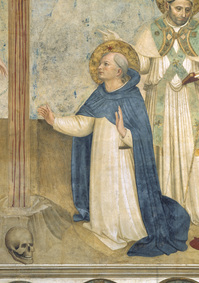 charity, guard humility, hold fast to voluntary poverty.” Dominic promised them that he would be of more use to them in heaven than on Earth–a promise I believe he keeps even today but he has a lot of work to do yet. Our beloved father was buried according to his wishes, “under the feet of his brethren.” Saint Dominic was canonized in 1234 by Pope Gregory IX.
charity, guard humility, hold fast to voluntary poverty.” Dominic promised them that he would be of more use to them in heaven than on Earth–a promise I believe he keeps even today but he has a lot of work to do yet. Our beloved father was buried according to his wishes, “under the feet of his brethren.” Saint Dominic was canonized in 1234 by Pope Gregory IX.
Following is a letter by Robert Kilwardby, an English friar of the Order of Preachers. He was Oxford educated, a popular teacher, held numerous positions in the Order, was the archbishop of Canterbury, he crowned Edward I as King of England, and he is known to publically oppose the works of his fellow friar, Saint Thomas Aquinas because of his use of Aristotle. This “Letter to Novices” provides an insight into heart of the Order of Preachers and thus into person of Saint Dominic.
Brother Robert, to the novices of the Order of Preachers, beloved in Christ: May you be enlightened by the grace of the sevenfold Spirit through your pursuit of holiness.
Consider your calling and notice its characteristics, so that you may magnify the Lord and exult in God our Savior.
First of all, you should know that, before our Order arose, certain holy people were vouchsafed revelations from God, which we now have in writing, showing that the prayer of the glorious Virgin obtained this Order from her Son, when he was angry at the sins of the world, for the reconciliation of sinners. And it is not unreasonable to believe that it is from her too that the Order’s progress and advancement and its guidance and preservation come. This has often been revealed from on high. So let us embrace our state of life all the more carefully, seeing how devotedly we ought to love such a patron, guardian and guide as we have in her, and how keenly we ought to honor her and how humbly we ought to reverence her.
Then you should know that this Order resembles the state of life the apostles, and that which our Savior deigned to display in his earthly life. Of him it is written, “Jesus began to preach and to teach, ‘Do penance, for the kingdom of heaven has come close.'” And again: “Jesus went about all the towns round about, teaching.'” Then he also laid his this job upon his disciples, saying, “Go into the world and preach the gospel.” And the apostle says, “He has put in us the word of reconciliation,” beseeching people for the sake of Christ, “Be reconciled to God.” Now what else, I ask you, does the Order of Preachers do, as it goes round so solicitously preaching the gospel and reconciling sinners?
So those who are called by a divine prompting to such a state of life ought rightly to boast in Christ, seeing that they desire to apply themselves to carrying out the very job of Christ himself and his apostles.
But some, who profess other states of life, say, “We too are likewise preachers, just as much as the members of the Order of Preachers.” To them we reply, in accordance with the truth, that there are indeed people in other states of life who preach, but they do not do it in the same way. For the friars of the Order of Preachers do it by virtue of the institution of their Order, by virtue of their job which gives them their name; others do it, certainly, but in imitation of them, because they cannot find anything better or more useful that they could do. So what our Order does essentially by virtue of its original institution, others try to do in imitation, incidentally and beside their formal profession. So we, who have been chosen precisely for this purpose, should rejoice that we are right, in virtue of our foundation, what others imitate out of devotion.
 Then you should notice the usefulness of our state of life, my beloved novices. In this, unless I am mistaken, our state of life ought, on any true calculation, to be preferred to all others. For all our Chapters and discussions and debates and all the Order’s study aim at nothing else than to prepare people and to make them fit for the salvation of souls, and, when they are prepared and equipped in their way of life and in knowledge, to direct them to the task of converting sinners. So I reckon that no other Order works as hard in its concern for this as ours does, or achieves so much by its work.
Then you should notice the usefulness of our state of life, my beloved novices. In this, unless I am mistaken, our state of life ought, on any true calculation, to be preferred to all others. For all our Chapters and discussions and debates and all the Order’s study aim at nothing else than to prepare people and to make them fit for the salvation of souls, and, when they are prepared and equipped in their way of life and in knowledge, to direct them to the task of converting sinners. So I reckon that no other Order works as hard in its concern for this as ours does, or achieves so much by its work.
Therefore, those who have such a vocation ought rightly to rejoice, since it is well known that at the last judgment the reward is to be meted out in accordance with what a man merits by his useful labor.
In addition to this, please look thoroughly at the special arrangements made in this Order about penance and austerity. The brethren of this Order are not prevented from edifying their neighbors in the fierce cold by the torment of having to go barefooted, nor, on the other hand, do they receive the comfort of going barefooted in the heat of summer. Also when they go out they do not enjoy the luxuries and delicacies of worldly cuisine. We believe that they reason for the first point, in God’s plan, is to avoid being prevented in any way from teaching people. The second and third points are to given an example of the austerity involved in salutary penance and of the perseverance in it. The one is necessary of truth is to be made known, the other is give an example of how to live.
Who would not cleave to such a state of life, once he had tasted its savor in his spirit?
If a question arises about poverty, on which many people vaunt themselves, I consider that our state is the one which is truly to be praised. Who would dare deny that the poverty of Christ and his disciples was more perfect than that of any other? Well, we read that most perfectly holy company of Christ and his disciples had purses and carried in them what they were given for their livelihood and brought food for them. We know that the Order of Preachers lives in just the same way, with the addition that they own houses and gardens and schools to hold their teaching in.
At this point some people claim that they possess nothing at all, either in common or individually, they hold no cash or money either in their own persons or through intermediaries, which is a far higher degree of poverty than the one I have been describing, which I said belonged to the company of the apostles. To this we reply that we do not wish nor should we wish to engage in quarrels, so we readily grant that their profession is as they say it is; may they do well in keeping it thoroughly! But it is enough for us in this regard not to go beyond the perfection of that apostolic poverty which Christ taught in the gospel.
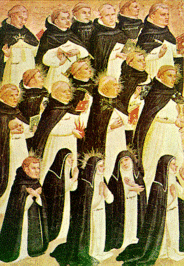 In addition, I would point out that nobody ought to regard himself as superior to the rest because of his material poverty, unless he is conscious of being more poor in spirit than the rest. It does not say, “Blessed are the poor in things,” but “Blessed are the poor in spirit.” If there are any who regard themselves as better than the rest because of their state of poverty because of this make less of others or reduce them in the eyes of men, then they ought to ask themselves whether they can reasonably be said to possess that poverty of spirit, in which humility resides, without seeking to make itself public, and in which humility resides, without charity too principally resides, which seeks always to commend other people.
In addition, I would point out that nobody ought to regard himself as superior to the rest because of his material poverty, unless he is conscious of being more poor in spirit than the rest. It does not say, “Blessed are the poor in things,” but “Blessed are the poor in spirit.” If there are any who regard themselves as better than the rest because of their state of poverty because of this make less of others or reduce them in the eyes of men, then they ought to ask themselves whether they can reasonably be said to possess that poverty of spirit, in which humility resides, without seeking to make itself public, and in which humility resides, without charity too principally resides, which seeks always to commend other people.
And, finally, since neither receiving nor possessing is a vice, nor is non-possession or non-receiving a virtue -it is the use of things which matters: if it is intemperate it is vicious, if it is temperate it is virtuous -what good is it boastfully to regard yourself as better than anyone else just on the strength of not receiving or not possessing anything, as if this constituted a more excellent state, when it is in fact indifferent, as far as vice and virtue are concerned?
So if anyone is to boast, it should be people who reckon that they excel in poverty because of their more sparing and temperate use of things, always provided that they attribute this to Christ and do not wish to be known in order to be praised, nor to be preferred to others in such a way that the others are despised; for it is the case, not only have they not won their reward, but because they have jettisoned humility and charity, they will actually be in a state of sin.
So let Christ’s poor receive and possess what is necessary for this mortal life, saving always the apostolic principle, which the Savior and his disciples observed, “Having food and enough clothing to cover them, with this let them be content.”
Maybe some wag will say, “Why, then, do you possess books and church furnishings, which are neither food nor clothing”? to this the answer is that the text of the apostle, “Having food, etc,” refers to people’s bodily life but this objection raises a matter of a person’s own spiritual benefit and that of his neighbor. The apostle did not neglect his books. And the primitive church established the principle of the faithful living together and having things in common, the first of which is necessary if the truth is to be preached, the second to give form to charity; for the first, there is no doubt that books are needed, and for the second, where men live together in a common life, church furnishings are needed.
Having said all this, to foster love of our state of life, we must go on to say that we should despise nobody and no state of life; it is profitless to fuss over human statutes and neglect the command of God which bids us love our neighbor as ourselves -on which St. Augustine teaches that “neighbor” must be taken to mean everybody. So let no individual person or state of life be found to be debarred from our love, which we have in God, because in commanding us to love even our enemies, he plainly showed that he wanted no one at all to be excluded from love. So, far from us be all detraction, criticism, insult, gossip or cursing, whether of people or any state of life, far from us be all comparisons at the expense of others. If we hear anyone telling stories of this kind or insinuating criticisms, we should rebuke him and deny him our attention, turning our faces sadly away from him. For, though we are bound by charity to commend our state in accordance with truth, we cannot detract from any other state.
From The Early Dominicans, Paulist Press
